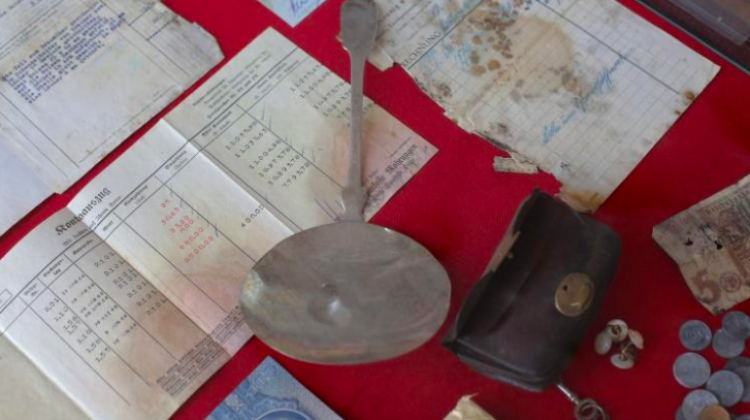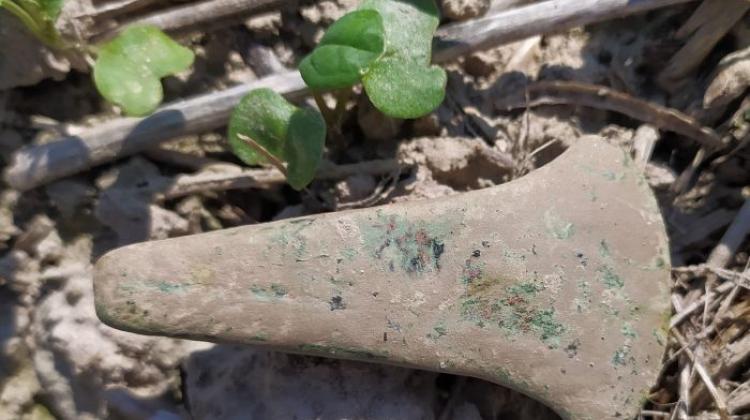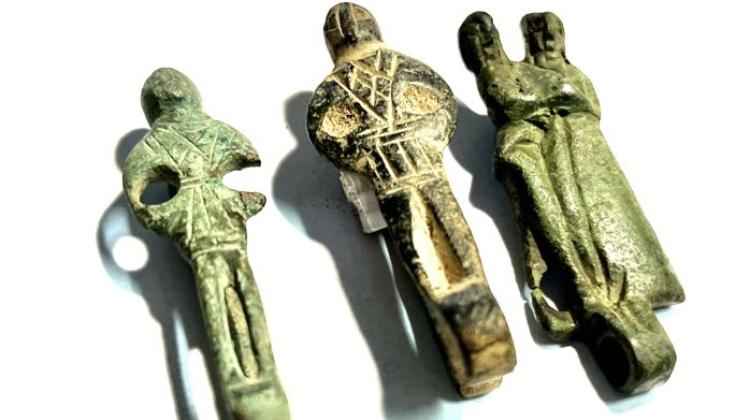Von Finckenstein treasure buried in 1945 discovered in Masuria
 Photo: PAP/ Tomasz Waszczuk 04.05.2018
Photo: PAP/ Tomasz Waszczuk 04.05.2018
Family heirlooms and belongings of the Prussian family von Finckenstein, former owners of the manor in Gubławki, hidden in the ground in 1945, have been found in the forest at Lake Jeziorak in Masuria. The discovery was presented in Iława.
Some of several hundred documents and other objects were presented during the press conference at the Iława district office. They spent over 70 years in tin cans, buried near the village of Gubławki at Lake Jeziorak.
Most of the objects are family heirlooms once owned by count Hans Joachim von Finckenstein, the owner of the local estate until 1945. They include numerous documents, such as the count`s last will with the family seal and coat of arms, his personal documents and a diary from the time of the First World War.
Hidden with them were personal belongings of the Prussian aristocrat: glasses, toiletries and pieces of clothing, hunting accessories, military decorations as well as Wehrmacht officer uniform and equipment. The deposit also included banknotes, jewellery, a pocket watch and a silver spoon, as well as letters and postcards, notes and family photo albums.
Two milk cans buried in the ground were found accidentally by Patryk Lessman (14), who spent May holiday with his parents on a plot on Jeziorak. The boy`s parents reported the discovery to regional history researchers from Iława - Michał Młotek and Dariusz Paczkowski. The find was secured and reported to the monument protection services, and then transported to the Museum of Archaeology and History in Elbląg.
The discovery was made almost a year ago, but it was announced only now due to the need for inventory, conservation and detailed research in the place where the deposit was found.
Members of the Iława Search Group searched the place of discovery with metal detectors at the request of the provincial conservator. They did not come across any other items related to the Finckenstein deposit. Michał Młotek found a battle axe from the late Middle Ages, which he donated to the museum in Ostróda. The searchers probably found relics of a medieval fortified settlement. The area is under conservation care and detailed archaeological research will be conducted there in the future.
The most important part of the von Finckenstein deposit, the historical and scientific monuments, is the property of the State Treasury. The objects will be exhibited in one of the museums in Warmia and Mazury. The museum staff will also to translate and make a scientific description of the count`s diary from the First World War.
The remainder of the find are personal items. Pursuant to the Law on Found Items, they have been returned to the heirs of the former owners. The starost of Iława Marek Polański handed them over to Count von Finckenstein`s daughter. Mrs. Waldtraut (81) came from Germany to retrieve them. She was very touched and thanked for returning valuable heirlooms to her.
The daughters of the owners of the manor in Gubławki - Waldtraut and Margarete - were sent to a family living in Western Pomerania a few months before the arrival of the Red Army. Their parents did not manage to escape the front. In March 1945, the count was arrested by Soviet soldiers and died in the camp in Pasłęk. His wife Hildegarda remained on the estate until November 1945, working for the Russians with other women. Then she left for Germany, where she was reunited with her children.
According to the findings of Michał Młotek, who described the story of finding the deposit on his website zdziennikaodkrywcy.pl, the count`s wife was probably the one who buried the family heirlooms in cans before leaving. "You can guess that these were things that could be used again after being retrieved, most of them had a sentimental value, so in a sense they were a family treasure, although we call it a deposit" - Młotek says.
In his opinion, a particularly interesting item for historians among the preserved documents is a unique letter of safe conduct issued to the owners of the mansion in Gubławki by a Soviet front officer who wrote: "Comrades and soldiers, please do not harm the inhabitants of this house. They welcomed us". Another document written in Russian mentions the appropriation of cattle and other livestock from the estate by the Red Army "by order of the front commander".
The Finckensteins - like the Dohns, the Doenhoffs and the Lehndorfs - belonged to the most influential aristocratic families in Prussia. Their ancestors probably came to these lands from the Duchy of Carinthia in the beginning of the 14th century, along with other knights who provided military support to the Teutonic Order.
For hundreds of years, representatives of this family held many important offices and military functions and the total area of their lands reached 14 thousand hectares. In the vicinity of Iława, they owned a Gothic castle in Szymbark and a baroque palace in Kamieniec, which are now in ruins.
The land estate in Gubławki, near which the deposit was found, in the years 1880-1945 belonged to the branch of the Finckenstein family from Jaśkowo. After the Second World War, a state-owned farm was established on the estate, and the manor house was adapted for offices and employee flats. (PAP)
author: Marcin Boguszewski
mbo/ ekr/ kap/
tr. RL
Przed dodaniem komentarza prosimy o zapoznanie z Regulaminem forum serwisu Nauka w Polsce.















